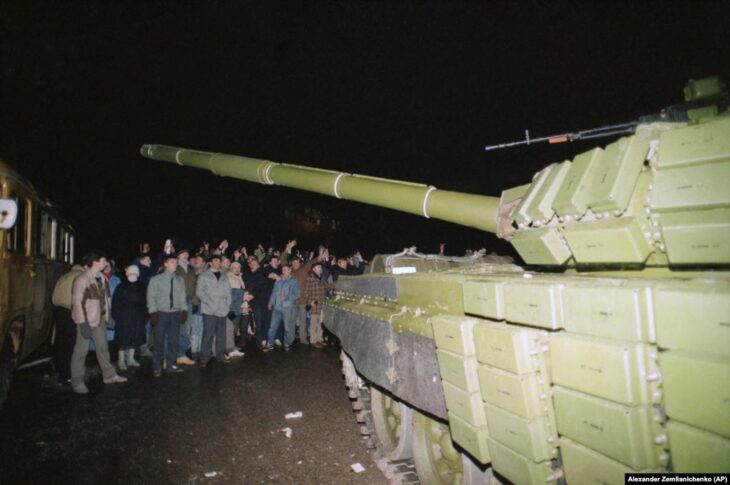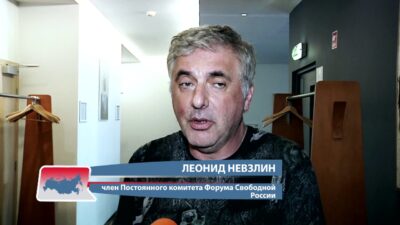
In the early hours of January 13, 1991, hundreds of Lithuanians headed to the TV tower in Vilnius, where they would make a stand against Soviet troops deployed to crush the Baltic state’s bid to reclaim independence. More than a dozen died, and hundreds were wounded.
The fall of the Berlin Wall in 1989 and the subsequent collapse of communist satellite regimes in Eastern Europe made it clear that Moscow’s power was waning, and the Soviet Union would in fact dissolve by the end of 1991. Months before that — but only after the Vilnius bloodshed in January — Moscow would recognize the independence of the Baltic nations.
Lithuania has designated January 13 as Freedom Defenders Day, paying tribute to the unarmed civilians who stood down Soviet forces in Vilnius.
“It’s our victory day,” said Marius Laurinavicius, a senior analyst at the Vilnius Institute for Policy Analysis. “Of course, it was a tragic day because 14 people were killed, but we defended our independence.”
For the Kremlin, it’s no cause for celebration.
Under Boris Yeltsin, who was elected president of Russia in June 1991, Moscow was one of the drivers of the disintegration of the U.S.S.R. into 15 independent countries.
But analysts say his successor, Vladimir Putin, has made defending many of the Soviet state’s actions abroad a priority — particularly when it comes to relations with Central and Eastern European nations in World War II and the decades of Soviet dominance that followed. Critics of the Kremlin charge that Putin is trying to rewrite the past — and for many Lithuanians, that includes the January events of 1991.
In a tweet on January 11, Lithuanian President Gitanas Nauseda wrote that “counterfeiters of history continue washing off their bloody hands & evading responsibility for the death of our freedom fighters.”
The January Events
On March 11, 1990, Lithuania’s legislative Supreme Council voted in favor of declaring independence. The Soviet Union, under President Mikhail Gorbachev, used economic and political pressure to try to thwart the bid to end nearly a half-century of rule from Moscow, which had annexed the Baltic states in 1940.
When that failed, Soviet troops garrisoned in Vilnius were deployed on January 11, 1991. Crack KGB units had been flown in days earlier. Their task: To take control of key sites in the capital — an effort that climaxed with the attack on the TV broadcast tower and sole TV station on January 13.
Lithuanians flocked to the site in the early hours, determined to stop the Soviet troops from taking control. Soviet tanks plowed into the unarmed demonstrators, who had been using their bodies to try to protect the building, according to media reports, before soldiers fired on the crowd.Fourteen civilians were killed by Soviet forces during those fateful days in January 1991, Lithuanian officials would later say, all but one of them during the storming of the state television station and TV tower. More than 700 were wounded.
It was the bloodiest attack on peaceful citizens in the Soviet Union since troops killed demonstrators in Tbilisi, the Georgian capital, in 1989. The television and radio stations, which broadcast throughout the republic, went off the air after the assault.
“We address all those who hear us. It is possible that (the army) can break us with force or close our mouths, but no one will make us renounce freedom and independence,” an announcer said before the station went silent.
Seeking Justice
Over the years, Lithuania — which joined NATO and the European Union in 2004, along with fellow Baltic states Latvia and Estonia — sought to bring those responsible for the bloodshed to justice.
It accused the court of ignoring witness testimony and of barring Russian diplomats from attending the trial, and asserted that its conduct reflected “the deconstructive course of the current Lithuanian leadership with regard to Russia.”
Russia also moved to prosecute the judges involved in the case, an action condemned by the European Parliament in November 2019 as “unacceptable external influence” and “politically motivated.”
Distorting The Record?
Much of the tension between Russia and the Baltic states has roots in the Molotov-Ribbentrop Pact, the 1939 Nazi-Soviet nonaggression treaty whose secret annex divided Central and Eastern Europe into spheres of influence, paving the way for the Soviet occupation of the Baltics.In March 2019, after a three-year trial, a Lithuanian court found 67 former Soviet officers and officials guilty of war crimes over the events of 1991. The highest ranking was former Soviet Defense Minister Dmitry Yazov, who was still alive at the time. All were sentenced to 10 years, all except one in absentia as Russia refused to cooperate with the court. Gorbachev also declined to testify.
A day after the sentences were announced, the Russian Foreign Ministry called the trial and verdicts “extremely unfriendly and essentially provocative,” and lashed out over what it described as “the bias and political motivation of this disgraceful judgment.”
In recent years, senior Russian officials have avidly defended the pact, which the Soviet Union condemned in 1989. In a 2020 article in the U.S. journal the National Interest, Putin rejected criticism of the Soviet Union’s actions and claimed the occupation of the Baltic states had occurred “with consent,” drawing accusations of a blatant attempt to rewrite history.
Lithuanian officials describe the Russian state’s treatment of the January 1991 events as part of what the Information Monitoring and Media Division of the country’s Foreign Ministry asserted was “a larger Kremlin disinformation and historical revisionism campaign not only against Lithuania, but the Western democracies in general.”
“We observe constant, intensifying attempts to discredit Lithuania’s post-WWII freedom fight, to portray the [Soviet] occupation of Lithuania based on secret protocols of the Molotov-Ribbentrop pact as the lawful accession of the country to the U.S.S.R., and to distort information on Lithuania’s place in the EU and NATO,” it said in a statement sent to RFE/RL.
Russian propaganda efforts relating to the 1991 crackdown in Lithuania are multipronged, said Peter Stano, lead spokesman for foreign affairs and security policy of the European Commission, the executive arm of the EU, whose External Action Service (EEAS) monitors Russian disinformation campaigns.
“So, first of all, they are accusing Lithuanians of provocations against the Soviet regime back then; they are insisting that Lithuanians actually killed their own people; they are saying there were no casualties; they say that the actual circumstances of that date remain unknown; that Lithuania is turning into a totalitarian country when dealing with the events from 1991; or they try to portray the restoration of Lithuania’s independence as some kind of unilateral withdrawal from the Soviet Union,” Stano told RFE/RL in an interview.
“This is the very standard way of operation of the pro-Kremlin disinformation actors. You know, just to create confusion so that no one is sure anymore which facts are to be believed and which facts not,” he added.
The Russian state-funded media outlet Sputnik has been singled out by the EEAS for its “disinformation” on the developments 30 years ago in Lithuania.
“The ‘version’ presented by Sputnik recycles Soviet disinformation. Its purpose: to create the illusion that the events of January 13 are widely disputed, and the truth remains unknown,” it said in a January 2020 posting on its EU Vs Disinfo website.
Trapped By The Narrative?
Sergey Radchenko, a Cold War historian at Cardiff University in Wales, argued that Putin could actually make a different case.
Yeltsin, who was chairman of the Supreme Council of the Russian Federation at the time and a rival of Gorbachev, condemned the Soviet crackdown in Lithuania. His voice of protest was not alone. Tens of thousands of people flooded Moscow’s central Manezh Square on January 13 to voice opposition to what was happening in Vilnius.
On September 7, 1991, Yeltsin – who was elected president of the Russian Federation in in June — would recognize the independence of Lithuania, Estonia, and Latvia, and all three were admitted to the United Nations later that month.
“At one level, Russia can make an easy escape in Lithuania by claiming that it was opposed to the crackdown in Vilnius, and that it was the Soviet Union that was responsible,” Radchenko told RFE/RL in e-mailed comments, adding that this was in fact the case. “It can even claim that it was a major contributor to the Baltic independence, and so adopt a position of moral authority. But given that, in most other ways, Putin has now decided to defend the Soviet Union’s legacy, he is being consistent by defending it also in the Baltics…where it would be easiest to reject it.”
Putin has pursued a “polarized” position, Radchenko added, making it “difficult to pursue nuance.”
“So if you choose to lionize the Soviet Union, you must go all the way, and all of its brutalities, and all if its horrible crimes, and all of its most painful legacies become your own, even in spite of yourself. Because if don’t do this, you are seen as giving in to the enemy’s narrative,” he wrote.




